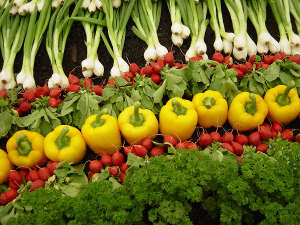 e buy organic food is to support small farms and nonindustrial-scale food production. This sensibility is a legacy of the 1960s, when the organic-food movement took off among those suspicious of corporations.
e buy organic food is to support small farms and nonindustrial-scale food production. This sensibility is a legacy of the 1960s, when the organic-food movement took off among those suspicious of corporations.The organic-food industry has come a long way since the days of the back-to-the-earth movement. It is a big, profitable and growing business. Big Food noticed this a long time ago. So today, much of the organic food in the U.S. is grown, processed and marketed by the very same companies many organic devotees find so objectionable.
Organic-food producers are well aware of this conflict. Their tactic for dealing with it? Silence.
Enjoy eating Stonyfield yogurt, which bills itself as "Obsessively Organic"? It's owned by Danone SA, a Paris-based company that posted sales of 21 billion euros ($28 billion) last year. You wouldn't know this by reading the packaging label or visiting Stonyfield's website, which tells visitors "We're still located right here in New Hampshire" beneath a picture of a cow loping along a country road.
The story is the same for Bear Naked granola. Kellogg Co., with almost $15 billion in sales in 2013, bought it in 2007. Again, there's no mention of corporate ownership on Bear Naked's website. Same for Naked Juice (PepsiCo Inc.), Odwalla juices and fruit bars (Coca-Cola Co.), Cascadian Farm cereals and prepared foods (General Mills Inc.), and dozens of other organic-food brands.
Obviously, disclosure of corporate parentage would detract from the mystique that is key to marketing organics. Click on one of the brands mentioned above, go to the tab about its history, and you will probably find a section that reads something like this:
The story of Cascadian Farm begins with the story of our founder, Gene Kahn. 40 years ago, Gene was an idealistic 24-year old grad-school dropout from Chicago, who just wanted to make a difference in the world. He recognized the delicate balance between nature and humans. Inspired by reading “Silent Spring” and “Diet For A Small Planet”, Gene wanted to go back to the land and farm in a way that would not harm the natural beauty of the earth or her inhabitants. So he set out to farm organically on a little stretch of land next to the Skagit River in the Cascade Mountains of Washington.
The text goes on to describe the brand's growth and increased reach, omitting that General Mills bought the company in 1999, which is what made much of that expansion possible. General Mills, naturally, understands that owning Cascadian Farms is good for its image and makes note of the fact on its website.
Owning organic brands is also good for the bottom line. Organic products command premium prices and usually are more profitable than conventionally produced foods. Annual sales are more than $30 billion and have risen 10 percent or more in some years. By comparison, conventional food sales grew just 2 percent from 2007 to 2012, the last year for which the U.S. Agriculture Department has figures:
So if you buy organic, it's possible you are helping a small, independent food producer engaged in sustainable and ethical agriculture. But odds are your dollars are going to Big Food.





